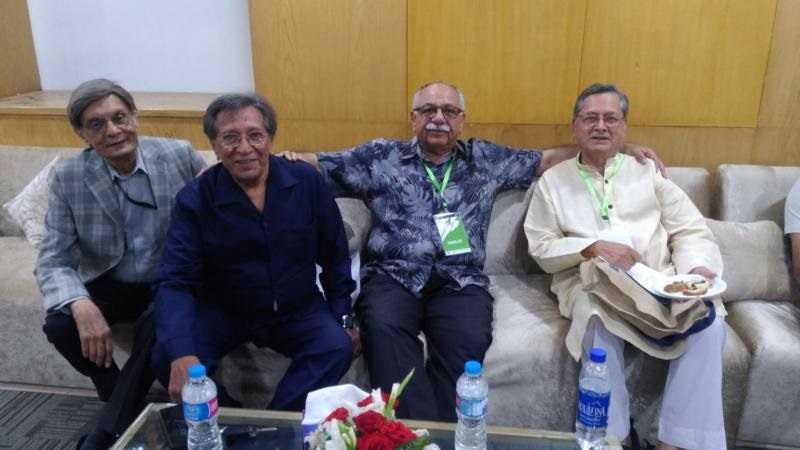
Written by: Muhammad Suhayb
Posted on: June 03, 2024 |  | 中文
| 中文
Talat Hussain
Talat Hussain, an illustrious name in the world of acting, exemplified a unique breed of actors who do not merely perform roles but adopt the role of the characters they portray. His ability to do that sets him apart as an actor, distinguishing him as one who transcends the conventional boundaries of performance.
Born in Delhi in 1940, Talat Hussain grew up in an environment that was ideal for nurturing his diverse talents. His father, a civil servant, encouraged his pursuits in singing and acting, while his mother, Shaista Begum, used to host radio programs as a hobby. After the Partition of the Indian subcontinent, the family moved to Karachi where his mother took up the role of an announcer on Radio Pakistan. Thus began Talat’s own journey in the world of entertainment.
Talat Hussain made his mark in the film industry with his role in Fazal Karim Fazli’s Chiragh Jalta Raha (the lamp kept burning) (1962), where he played Deeba’s younger brother. The film, a debut for Fazli Sahib, presented notable actors such as Muhammad Ali, Zeba, Kamal Irani, to the filmdom. Hussain's early foray into cinema showcased his potential and versatility. In 1969, he appeared in Waheed Murad’s Ishara (signal), portraying Ishrat, Deeba’s intended husband. The character ultimately had to sacrifice his love for Waheed Murad’s character, Aamir, quite similar to the way Akshay Kumar paved the way for Shahrukh Khan’s Rahul in Yash Chopra’s Dil tu Paagal Hai (This heart is crazy), years later. This role highlighted Talat’s ability to convey deep emotional complexity, further consolidating his reputation as a talented actor. Next year, in Insaan aur Aadmi (human and man) Talat experimented with a pseudonym, Farooq Jalal, and took on the challenging role of Zeba’s son. Only Talat could have matched Muhammad Ali’s powerful persona on screen with his dynamic presence.
After the arrival of television, Talat appeared in some serials, developing his signature pause. Soon he thought it was good to learn from the best, and he enrolled himself in the London School of Music and Dramatic Art. He also worked in BBC and English theatre in order to develop his skills further. The gamble paid off and on his return to Pakistan, he emerged as a better actor. He initially explored singing and even dabbled in critiquing foreign films, however, it was in acting that he ultimately found his true calling.
From PTV’s first color play Parchayain (shadows), Talat Hussain became a household name in Pakistan. His ability to deliver powerful performances, even when he was not cast as the main hero, allowed him to capture the hearts of viewers and gain widespread appreciation. This talent for making a significant impact in supporting roles is a testament to his acting skills and charisma.

Talat Hussain with friends. (R to L) Asif Noorani, Arshad Mehmood, Talat Hussain and late Sultan Arshad.
Talat Hussain never let go of a powerful script and did roles in films like Gumnaam (Nameless) (1983) and Kaamyabi (Success) (1984). Pervez Malik’s Hulchul (Uproar or Tumult) (1985) had him play Turkish actor Nazan Sanchi’s father, while with Hum se Hai Zamana (this era belongs to us), the same year, he tried to play the bad guy. On television, he was seen romancing Khalida Riyasat in Bandish (Stoppage) and Typist, Roohi Bano in Sarab (Mirage) in the 80s, while in movies, he was either a suitor for Shabnam’s character Shama in Nazrul Islam's Bandish or her father in Gumnaam.
In the ‘90s, he transitioned to more mature character roles, and one of his standout performances from this period was the role of Aalijah. His portrayal of the antagonist in the Network Television Marketing (NTM)’s Kashkol (Beggar’s Bowl) is particularly memorable, leaving a lasting impression due to the power and intensity he brought to the evil character he played. His performance as Mir Muhammad in Asghar Nadeem Syed’s Hawayein (the Winds) for Pakistan Television can be considered his second-best, where the character’s death moved the audience deeply. He appeared in several plays of noted playwright Anwar Maqsood, a couch potato in a long play Funoon-e-Latifa (Artistic) and Nawab sahib in Nadan Nadia (Innocent Nadia) with Babra Sharif, being the most notable.
Talat Hussain acted in the UK series Traffik, followed by Family Pride, that were produced by another thespian Zia Mohyeddin in 1989. He had the honor of playing a powerful role in the Norwegian film Import Eksport (Import Export) in 2006, for which he also received the Amanda Award in 2006 for the best supporting actor. This was his second experience working with a European director; Jinnah (1998) was the first, where he appeared in a short but effective role. He even acted in a Bollywood film, Souten ki Beti (Second Wife's Daughter) (1989), where he easily overshadowed veterans like Jeetendra, Jaya Pradha and Rekha, with his performance.
A man of many talents, Talat Hussain was well-read as well as well-versed in various artistic disciplines. His prowess lay in his voice, for he could move you to tears while reading a Marsiya (elegiac poem written to commemorate the martyrdom and valour of Hussain ibn Ali and his comrades of the Karbala) on television, while the next day, he would be selling you a product in an ad. This quality defined Talat Hussain's legacy in the realm of acting, marking him a true artist who brought an intensity to the characters he played.
He was awarded the Pride of Performance in 1982 and Sitara-i-Imtiaz by the President of Pakistan in 2021. He also taught acting for a couple of years at the National Academy of Performing Arts (NAPA) and was a regular at the Arts Council of Pakistan, Karachi. Talat Hussain breathed his last on 26 May 2024, leaving a family and millions of fans to mourn him.
You may also like: